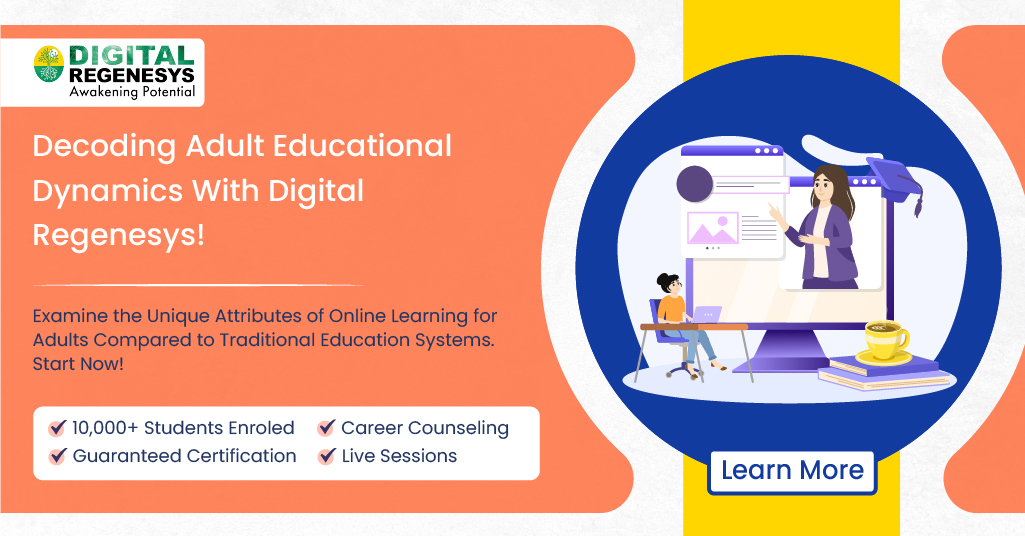What Makes Online Courses Different from Traditional Learning?

Introduction
The educational realm is experiencing a major transformation with the rise of online courses designed for learners. This change goes beyond just enrolment in academic programmes; it fundamentally changes the idea of education in the digital era. Online learning platforms eliminate barriers that are used to prevent learners from getting an education, providing a flexible option that goes beyond the limitations of traditional classrooms. Let’s explore how courses online can help individuals develop habits of lifelong learning and thrive in an ever-changing world, from the flexibility of unsynchronised learning to personalised pathways meeting individual needs.
This in-depth article thoroughly analyses the characteristics differentiating traditional education from online courses, exploring their distinct needs, preferences, and learning styles.
What Is Online Learning?
Online Learning, also known as distance education or E-learning, utilises digital technology to expand learning opportunities beyond traditional classroom settings. By using online platforms, learners can access a wide range of course materials, participate in interactive lectures, and use assessment tools, allowing them to customise their learning experience based on their schedule and location preferences. This online environment provides educational material in different multimedia forms to meet the needs of various learning preferences and encourages learners to develop self-directed study abilities. In order for online learning to be effective, it relies on having a strong digital infrastructure and using creative teaching methods to engage learners and help them succeed, despite its advantages in accessibility. It is essential to continually adjust to changing technology and educational norms to improve online learning experiences more effectively.
Also read: What to Look for in Online Courses for Professional Growth?
What is Traditional Learning?
Traditional Learning is firmly rooted in the history of schooling. It entails a long-standing approach where learners gather in person in classrooms, whether at schools or colleges, to engage with their teachers directly. Learners are guided through the complex process of acquiring knowledge by incorporating lectures, discussions, and textbooks, with assessments used to evaluate their understanding. This approach encourages teamwork among learners and allows easy access to educational resources in a structured curriculum. Nevertheless, with the evolution of education, traditional learning is being examined, leading to the incorporation of modern pedagogical methods and advanced technologies to enhance its effectiveness and importance in today’s constantly changing educational environment.
Key Differentiators Of Online And Traditional Learning
In this modern era of technology, online certification courses provide a transformative educational opportunity. These courses offer features such as flexibility, inclusivity, personalised learning, collaborative communities, and continuous feedback. Let’s examine how these essential characteristics help create a lively and efficient learning setting for individuals looking to improve their expertise and abilities.
Flexibility and Convenience
Online Learning: The core of online classes for interested learners is an unparalleled level of flexibility and convenience. Online courses offer a flexible learning environment that releases learners from the limitations of time and location, empowering them to control their learning experience according to their own schedule and convenience. The online learning process allows learners to overcome geographical and time constraints, making it easier for them to balance their work, personal, and family responsibilities. This adaptability not only improves access but also promotes a culture of ongoing education for trainees looking to enhance their knowledge and skills in today’s complicated world.
Traditional Learning: Traditional learning usually adheres to set timetables and necessitates students to physically attend classes at particular places, restricting adaptability and catering to fewer varied lifestyles and obligations. This methodical approach could be difficult for people who have busy work schedules, family responsibilities, or other commitments that clash with set class schedules and locations.
Accessibility and Inclusivity
Online Learning: Online courses for interested learners demonstrate the universalisation of education through their increased accessibility and inclusivity. Conventional education can create difficult obstacles for people with disabilities or living in remote locations, pushing them to the outskirts of educational discussions. In strong contrast, online certification courses break down these obstacles, using the transformative potential of technology to broaden the accessibility of education worldwide. By utilising adaptive technologies, closed captioning, screen readers, and other assistive tools, online courses guarantee that every learner can fully engage in the learning process, no matter where they are or their abilities. This inclusivity enhances the educational experience and promotes feelings of belonging and empowerment in learners from various backgrounds.
Traditional Learning: Conventional schooling frequently faces challenges in meeting the needs of people with disabilities or those living in isolated areas, unintentionally excluding them from educational options. Physical obstacles, like buildings that cannot be accessed or a shortage of specific resources, may restrict entry to education.
Diverse Learning Resources
Online Learning: The online courses available for learners offer a variety of resources, such as interactive simulations, multimedia presentations, scholarly articles, and real-world case studies, creating a diverse learning environment. Unlike traditional textbooks and lectures that typically have a uniform approach to education, online courses utilise various digital tools and multimedia platforms to accommodate a learner’s diverse learning styles and preferences. These resources, such as immersive virtual labs, engaging video tutorials, and collaborative discussion forums, enhance the engagement, critical thinking, and knowledge retention of learners navigating the digital frontier.
Traditional Learning: Traditional educational resources typically depend on textbooks and lectures, offering limited access to various learning materials. This uniform method may not completely accommodate the diverse learning styles and preferences of the learners.
Personalised Learning Pathways
Online Learning: The essence of online courses is the concept of customised learning paths designed for personal needs, objectives, and learning styles. Online platforms use advanced algorithms and data analytics to create tailored learning experiences that adjust and develop in real time based on the individual strengths, weaknesses, and interests of each learner. By utilising diagnostic assessments, competency-based progression, personalised feedback, and adaptive learning modules, these courses enable learners to be in control of their educational path, promoting a sense of independence, empowerment, and self-confidence. This individualised strategy boosts motivation and involvement while fostering a long-lasting passion for learning beyond traditional educational models.
Traditional Learning: Traditional education typically uses a standardised approach that does not cater to each individual’s unique needs, preferences, and abilities. Students might discover that they are following a set curriculum with limited freedom to learn at their own speed or delve further into subjects of personal interest.
Collaborative Learning Communities
Online Learning: Online courses with certificates for learners create vibrant and interactive learning communities that go beyond typical perceptions of online learning as a solitary activity, breaking down barriers of time and space. Trainees build significant relationships with peers and instructors by engaging in virtual collaboration tools like discussion boards, group projects, and peer-to-peer feedback, exchanging insights, experiences, and perspectives in a dynamic and inclusive setting. These learning communities that work together not only enhance learning but also develop important skills like communication, collaboration, and teamwork, getting learners ready for a world that is becoming more interconnected and globalised.
Traditional Learning: Unlike traditional classrooms, which mainly involve in-person discussions during set class times, online learning communities promote ongoing interaction and teamwork without being constrained by location or time zone. Conventional educational environments might find it difficult to offer similar interaction and collaboration opportunities beyond official classroom environments.
Continuous Feedback and Assessment
Traditional Learning: Online courses for learners incorporate a culture of constant evaluation and feedback, utilising new tools and approaches to assess learner advancement and skills at the moment. Online assessments differ from traditional exams and standardised tests by continuously providing insights into learner performance, allowing instructors to adjust instruction and intervention strategies. From informal assessments and feedback from peers to interactive quizzes and evaluations based on projects, these courses provide various chances for learners to show their comprehension and receive prompt feedback from instructors and classmates. This step-by-step method of evaluation encourages a more thorough understanding and proficiency in topics while also nurturing a positive attitude and perseverance when encountering academic obstacles.
Traditional Learning: Regular evaluations, such as midterms and finals, usually happen at set times and may not offer students prompt feedback to understand their development and work on their weak points. Moreover, conventional assessment techniques might fail to encompass all of a student’s capabilities, constraining chances for development and enhancement.
These compelling features highlight why individuals are more inclined towards online courses rather than traditional educational methods. Online learning platforms offer strong advantages in today’s educational environment, allowing learners to take control of their education by offering more independence, involvement, and achievement.

Conclusion
Ultimately, the rise of online courses with certificates aimed at learners marks a major shift in the field of education, highlighting the importance of adaptability, availability, and individualised learning. These programmes empower individuals to escape conventional limitations, promoting ongoing progress and advancement. With the advancement of technology, online courses are leading the way in developing innovative methods of learning, providing opportunities for continuous education. Learners around the globe are taking advantage of opportunities to follow their passions and broaden their understanding. In the end, online classes reshape the education landscape, promoting a mentality in which learning has no limits, enabling people to reach their objectives no matter their situation.
Uncover the gateway to endless possibilities in education with Digital Regenesys. Embrace the future of learning and unlock your limitless potential now!
Last Updated: 22 October 2025
